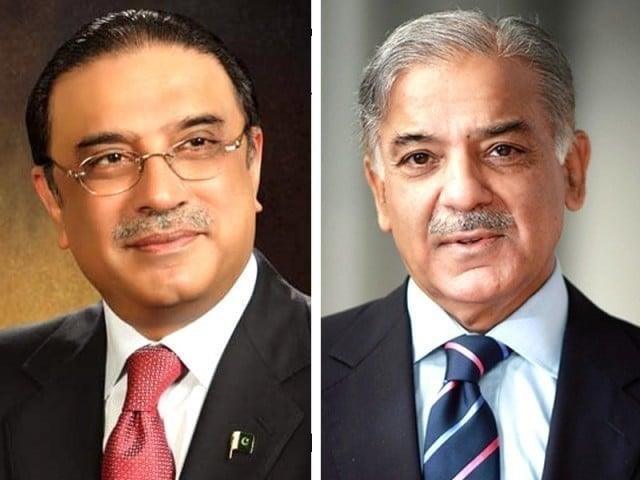ISLAMABAD:
The idea of three political titans – Nawaz Sharif, Asif Ali Zardari and Imran Khan – sitting around a table to untangle Pakistan’s long-running crises might seem like a pipe dream.
However, in a country where the political board is often more unpredictable than its players, even improbable ideas can spark meaningful conversations. As calls for dialogue between bitter rivals gain momentum, some leaders are raising bold proposals, hoping to end decades of turmoil.
Among them, Prime Minister Shehbaz Sharif’s political advisor Rana Sanaullah believes that a 70-day deadline is all the three would need to resolve the crises if they agreed to meet. Defense Minister Khawaja Asif has gone a step further and called for a new social contract that includes the army, the judiciary and the bureaucracy.
However, the path to such negotiations is fraught with challenges. Political experts weigh in on whether such talks are feasible, what obstacles stand in the way, and what it would take to push these political heavyweights to the negotiating table.
For political analysts, the prospect of seeing Nawaz Sharif, Asif Ali Zardari and Imran Khan share a table seems impossible for now due to deep political divisions, conflicting agendas and lack of trust.
However, experts emphasize that while high-profile talks between party bosses may eventually be necessary, significant groundwork and confidence-building measures must first be done at the second-tier leadership level.
“Having the three leaders sit together seems impractical and unlikely, but the back-and-forth process will seek approval from the top leadership anyway,” said Pakistan Institute of Legislative Development and Transparency (PILDAT) president Ahmed Ahmed. Bilal Mehboob.
The PILDAT chief argued that the idea of top political leaders sitting together may seem far-fetched, but it is not entirely irrelevant, adding that there may be some thorny issues that cannot be resolved by the second tier and may need to be resolved. refer to superiors. leadership.
Addressing Asif’s suggestion of including the judiciary, army and bureaucracy in such talks, Mehboob was unequivocal: “Involving judiciary, military and intelligence agencies in talks is not a good idea. They have no constitutional role. in political negotiations, and carving out a formal role for them would be disastrous.
Raza Ahmad Rumi, political analyst and journalist, believes Rana Sanaullah’s suggestion makes a lot of sense in principle and represents the best way forward. “All major political parties should sit together and draft a new charter of democracy, one that keeps civilian supremacy at its core and promises not to undermine civilian rule at any cost,” Rumi said.
However, he acknowledged that achieving this lofty goal seems almost impossible in the current charged and polarized environment. “Political parties see each other as enemies and seek the support of the military establishment to gain or retain power,” he observed.
Despite the challenges, Rumi expressed hope for the future, stating that such a pact may not come to fruition in the short term, but will eventually take shape. “At some point there will be a new charter for democracy because the current situation is unsustainable and unsustainable,” he added.
However, immediately, Rumi was skeptical about the success of the dialogue between the PTI and the government. “Some of the demands made by the PTI will not be acceptable to the incumbent government and its current patron i.e. the establishment,” he said.
However, he stressed that the dialogue process was unlikely to disappear completely. “This process will continue and could suffer several failures before it leads to an understanding of the fate of political affairs, including the role of Imran Khan and the holding of new elections, perhaps more akin to mid-term elections,” Rumi concluded.
Eminent scholar Professor Dr. Hassan Askari also expressed skepticism about the viability of these proposals and described Sanaullah’s suggestion as symbolic but unattainable in the current political climate.
“Second-level leaders need to create an atmosphere first,” he said, adding that confidence-building measures must then be taken before top leaders can come to the table.
Professor Askari said it is a step-by-step process, but there are no signs yet that all parties are willing to take things in that direction. He pointed to the conflictive dynamics within the PML-N, where Nawaz Sharif’s camp favors dialogue, but Prime Minister Shehbaz Sharif’s allies are inclined to marginalize opponents with institutional support.
He also warned against involving non-political stakeholders, calling Khawaja Asif’s approach impractical and likely to complicate matters further.
Commenting on the overall situation, Professor Askari said that the government and the PTI must give positive gestures so that the ongoing talks are not only successful but become a basis for future talks between the party leadership.
Talks and threats cannot go hand in hand, he noted, saying the government should stop crackdowns, arrests and arrests of opponents in cases, while the PTI should avoid holding talks and continue its crackdown. civil disobedience.
Despite their skepticism, experts stressed the need for all parties to de-escalate hostilities and create an atmosphere conducive to dialogue. They urged both sides to demonstrate positive gestures to foster mutual trust.




